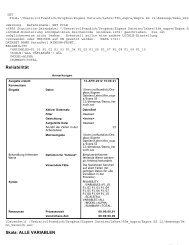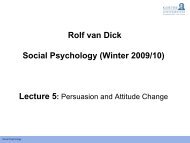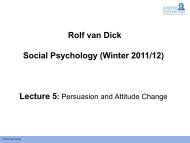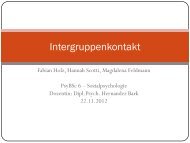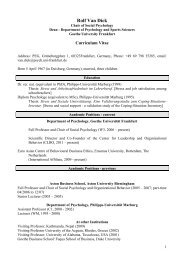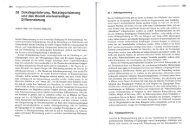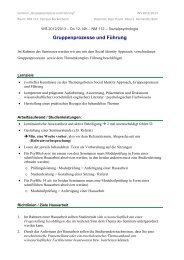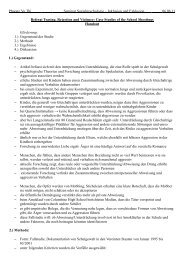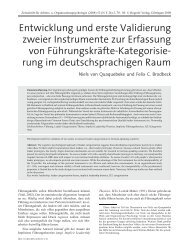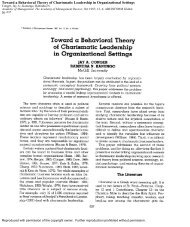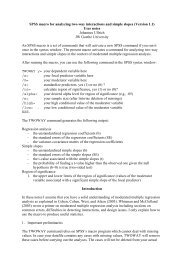Leadership-Interview-Transkript - Sozialpsychologie - Goethe ...
Leadership-Interview-Transkript - Sozialpsychologie - Goethe ...
Leadership-Interview-Transkript - Sozialpsychologie - Goethe ...
Sie wollen auch ein ePaper? Erhöhen Sie die Reichweite Ihrer Titel.
YUMPU macht aus Druck-PDFs automatisch weboptimierte ePaper, die Google liebt.
The 14 th Dalai Lama of Tibet<br />
Short biography<br />
His Holiness the 14th Dalai Lama, Tenzin Gyatso, is both the head of state and the spiritual<br />
leader of Tibet. He was born on 6 July 1935, to a farming family, in a small hamlet located in<br />
northeastern Tibet. At the age of two the child was recognized as the reincarnation of the<br />
13th Dalai Lama. The family was relocated to Lhasa, the administrative capital of the Tibet<br />
Autonomous Region in the Republic of China. His Holiness began his monastic education at<br />
the age of six. At the age of 11 he met the Austrian mountaineer Heinrich Harrer (†2006),<br />
who became his videographer and tutor about the world outside Lhasa. At the age of 15, the<br />
14th Dalai Lama was enthroned formally as the temporal ruler of Tibet. In 1959, at the outset<br />
of the Tibetan uprising, the Dalai Lama and his retinue fled Tibet and set up the Government<br />
of Tibet in Exile in Dharamsala, India. The Dalai Lama’s appeal to the United Nations on the<br />
rights of Tibetans resulted in three resolutions in 1959, 1961, and 1965, which called on<br />
China to respect the human rights of Tibetans. In 1963 His Holiness presented a draft<br />
democratic constitution for Tibet that was followed by a number of reforms to democratize<br />
the administrative set-up. In 1987, the Dalai Lama gave a speech outlining his ideas for the<br />
future status of Tibet and proposed the Five Point Peace Plan for Tibet as the first step<br />
towards a peaceful solution. The Dalai Lama has received numerous awards over his spiritual<br />
and political career. In 1989 he was awarded the Nobel Peace Prize for his non-violent<br />
struggle for the liberation of Tibet. Recently, he was listed by the Watkins Review as the<br />
second most spiritually influential person in the world. In a speech given in March 2011, the<br />
Dalai Lama stated that he will propose changes to the constitution of the Tibetan government<br />
in exile which will remove the Dalai Lama's role as head of state, replacing him with an<br />
elected leader. If accepted by the Tibetan parliament in exile, this will constitute the Dalai<br />
Lama's retirement from his formal political role, although he will retain his position as a<br />
religious dignitary.<br />
<strong>Interview</strong> conducted in Frankfurt am Main on August 22 nd , 2011<br />
Rolf van Dick: Your Holiness, thank you very much, this was very insightful [refers to the<br />
Dalai Lama’s speech that he held before]. Before I open up to the audience, I would have one<br />
or two short questions. The first question sounds rather simple – do we need leadership at all?<br />
Is leadership important? Or are most people intrinsically motivated to do the right and good<br />
thing, and can we abandon all leaders?<br />
Dalai Lama: You cannot abandon your government. To govern is necessary. So there must<br />
be leaders in any way. The democratic system is, I think, the best system. The reason: the<br />
world belongs to humanity. Not kings or religious leaders, but to the people. So, Germany<br />
belongs to German people. In order to rule the people by the people, that’s the democratic<br />
system. Now, the change, or some sort of big change, under one individual leader is, I think,<br />
difficult. I think leaders who come from a community where there is not much concern about<br />
moral ethics or short-sighted. Then, leaders who come from the middle of society, of course,<br />
they are also part of the society. So now, to education. I usually tell the people like my age,<br />
over 70 and also 60, I see many of you – my generation, who belongs to the previous century.<br />
So now, those young people, below 20, you are the generation who belongs to the twentyfirst<br />
century. Now, my generation, almost now, is gone. So ready to say ‘bye bye’. So, this<br />
century, about 10 years past, now almost 90 years yet to come!So, the generation who belongs




